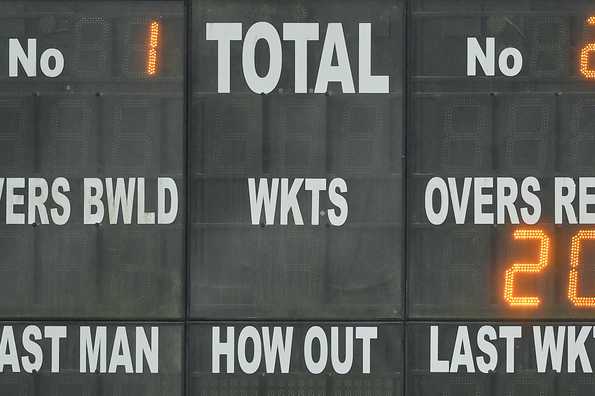The International Cricket Council (ICC) has announced adjustments to the playing conditions for Twenty20 Internationals (T20Is), with a primary focus on refining the PowerPlay calculations. The key change involves calculating the PowerPlay length to the nearest ball, rather than rounding to the nearest over.

Under the existing rules, the first six overs constitute the PowerPlay, which is approximately 30% of a full 20-over innings. However, when innings are shortened due to weather or other delays, rounding to the nearest over can significantly alter the proportion of PowerPlay overs.
The ICC has provided a table to clarify how the number of PowerPlay overs will be adjusted in shortened matches. The table applies to both the first and second innings.
| Match reduced (overs) | Powerplay overs |
|---|---|
| 5 | 1.3 |
| 6 | 1.5 |
| 7 | 2.1 |
| 8 | 2.2 |
| 9 | 2.4 |
| 10 | 3 |
| 11 | 3.2 |
| 12 | 3.4 |
| 13 | 3.5 |
| 14 | 4.1 |
| 15 | 4.3 |
| 16 | 4.5 |
| 17 | 5.1 |
| 18 | 5.2 |
| 19 | 5.4 |
For example, under the previous system, an 8-over innings would have two PowerPlay overs, while a 9-over innings would have three. With the new system, the PowerPlay will end after 2.2 overs and 2.4 overs, respectively, maintaining a proportion closer to 30%.
The ICC stated that this system has been successfully used in the T20 Blast in England for many years. The ICC Men's Cricket Committee has accepted it as the preferred method moving forward. In the 8-over example, the umpire will signal the end of the PowerPlay after two balls of the third over, allowing three additional fielders to move outside the inner circle.
The ICC has also updated the guidelines for concussion replacements in Men's T20I matches. Teams must now identify and name potential replacements before the start of the match. This aims to create a level playing field by mitigating any home team advantage related to having a larger pool of available players.
The preferred approach is to nominate and name the following concussion replacements to the match referee:
The ICC acknowledged that Associate Member teams might find it challenging to identify five specific concussion replacements for every match, particularly when playing overseas. The system adopted for Associate Member T20Is will accommodate this difficulty.
Teams are permitted to nominate a batter as the replacement wicketkeeper. However, the referee has the discretion to determine whether the nominated batter must keep wicket if used as a replacement or allow another player from the starting XI to keep wicket instead. The overarching principle is to ensure a like-for-like replacement, preventing teams from gaining an unfair advantage. The referee has the final say in determining if a replacement player is sufficiently similar to the injured player.
Regarding the use of saliva on the ball, the ICC has clarified that if any substance, including saliva, is used to alter the ball's condition, the ball must be replaced. However, to prevent teams from deliberately applying saliva to trigger an automatic ball change, the new clause gives the referee discretion to prevent the ball from being automatically changed under these circumstances.
These changes currently apply only to the Men's playing conditions. The Women's playing conditions will be updated in October. All new playing conditions will take effect from July 10, 2025.
Newer articles
Older articles
 Team India Settles in Birmingham: Rahul's Mattress, Coaches' Strolls, and the Enduring Coffee Ritual
Team India Settles in Birmingham: Rahul's Mattress, Coaches' Strolls, and the Enduring Coffee Ritual
 Android Users Urged to Patch Devices Immediately Following Critical Security Flaws Alert
Android Users Urged to Patch Devices Immediately Following Critical Security Flaws Alert
 Ashada Gupt Navratri 2025: Dates, Auspicious Timings, and Esoteric Significance Explained
Ashada Gupt Navratri 2025: Dates, Auspicious Timings, and Esoteric Significance Explained
 JPG to PDF: A Graphic Designer's Guide to Conversion & Best Practices
JPG to PDF: A Graphic Designer's Guide to Conversion & Best Practices
 Skin Cancer Alert: How to Identify Suspicious Moles and Early Warning Signs
Skin Cancer Alert: How to Identify Suspicious Moles and Early Warning Signs
 IRCTC's AskDisha 2.0: AI Chatbot Streamlines Train Ticket Booking, Refunds, and Travel Information
IRCTC's AskDisha 2.0: AI Chatbot Streamlines Train Ticket Booking, Refunds, and Travel Information
 The stat that could swing every NBA team's 2025-26 season
The stat that could swing every NBA team's 2025-26 season
 Bollywood's Mythological Muse: How Indian Epics Inspire Cinematic Storytelling
Bollywood's Mythological Muse: How Indian Epics Inspire Cinematic Storytelling
 Bollywood Flashback: Jackie Shroff Accused of Untoward Advance on Young Tabu at Danny Denzongpa's Party
Bollywood Flashback: Jackie Shroff Accused of Untoward Advance on Young Tabu at Danny Denzongpa's Party
 Popular Finance YouTuber's Account Hacked: Bitcoin Scam Alert and Security Tips
Popular Finance YouTuber's Account Hacked: Bitcoin Scam Alert and Security Tips